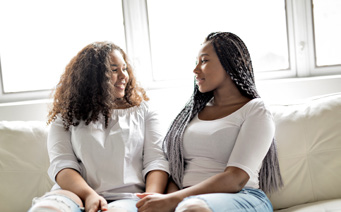by ANNABEL COOPER
Learning about the proverbial ‘birds and bees’ is a seminal moment in any young person’s life. But, talking about sex and bodily functions, especially when it’s parents talking to their own children, can also be embarrassing.
Blushes aside, a 2016 survey conducted by US organisation Power to Decide, found that for teenagers, “parents most influence their decisions about sex” over friends, the media, religious leaders and teachers.
It’s therefore vital that instead of leaving them to find out by themselves, the trusted adults in their lives talk to children about sex, relationships, their bodies, and the other issues that come with it. These include consent, sexual health, boundaries and pregnancy, and, the younger you start, the easier it is. But, how do you start?
Elisha Miller, founder of 5 Circles BDA, has been a sex educator for over 15 years and she said it’s important to normalise bodily functions and the correct terminology early on. She also said a ‘series of talks’ is more effective than just ‘the talk’:
“You want to have these conversations from when kids are young, so toddlerhood but, those are very basic conversations around correct body parts. Saying things like vulva and vagina and penis, instead of cookie and muffin.”
She added that by teaching children the correct terminology you may also be helping to prevent child sexual abuse.
“If a child comes to a trusted adult and they say ‘so and so touched my cookie’, as opposed to ‘so and so touched my vulva’, it’s going to have a very different response.”
Other topics she advised adults talk to children about early on are bodily autonomy and consent.
“How do they like to be shown affection? How do they like to be touched? Are they comfortable with a hug? Are they more comfortable with a high five? Asking them,” she said.
A common misconception is the belief that if you talk to young people about sex they are immediately going to go out and have sex. Research has shown however, that this is not the case.
“When the talks are early and often, young people tend to delay the onset of any kind of sexual activity or behaviour,” said Ms Miller. “And, when they do engage in it, it’s much safer, it’s consensual, and they’re more body aware, as well as the fact they have healthier relationships too. They’re not willing to compromise themselves for someone else’s sexual benefit.”
While there’s no one prescribed method that’s going to work for everyone, Ms Miller advised identifying what your values are before beginning these conversations, and taking advantage of “teachable moments”, for example if something relevant comes onto the television.
When talking to children or teenagers about sex, she also said it needs to be done in a positive way. Young people should never feel ashamed to ask a question.
“This conversation may be uncomfortable, and that’s perfectly ok, but we don’t want to instil the idea of shame into our kids,” she said. “When we’re having conversations with our young people we have to watch our tone. Why did you ask that? Why did you do that?
“If there’s a question that a young person asks you and you’re unsure of the answer, acknowledge that. That’s fine – ‘that’s a great question, let’s look it up together.” In that situation, she recommended online resources advocatesforyouth.org and amaze.org.
A problem in Bermuda that Ms Miller is working to rectify is the fact that there is no comprehensive sex positive education in school:
“It’s very needed,” she said. “Where are our young people getting this from? A lot of the time, it’s not coming from trusted adults. It’s coming from media, peers and that can lead to risk taking behaviours.”
She also warned that considerable misinformation exists around sex and relationships, and this is apparent in some of the worrying questions and comments she hears from young people, such as the belief that you won’t get pregnant if you stand up straight away or use the bathroom immediately after sex.
Access to online pornography is also an important issue and one that trusted adults should be talking to young people about. “Porn is made for entertainment. It’s actors as opposed to education, but when we have young people using pornography as sex education then we start to run into bigger issues.”
She pointed out, for example, that pornography portrays neither safe sex nor body diversity.
“A goal of sex education is to provide young people with accurate information so they can make informed choices and decisions for themselves. You’re essentially arming them with the facts they need to know to make these decisions.
“If you tell a young person ‘no, no, no,’ what are they going to do? They’re going to turn around and do the exact opposite.”
Talking about sex doesn’t always come easy but, by laying a foundation early, and progressing the conversation in a positive way as children get older, it will become normalised and therefore easier.
“It shouldn’t be a one time, one conversation,” she said. “They’re much more impactful if they are ongoing, and our young people are more likely to come and ask us or tell us about things that have made them uncomfortable, or things they’re unsure of, rather than hiding it, telling a peer about it, or going onto the Internet and finding misinformation.
“If we can normalise these conversations, normalise and celebrate bodies and their diversity, normalise consent, teach them about pleasure, it will go a long way in helping to raise sexually well, healthy and safer young people.”
5 Circles BDA was born out the need to get the population of Bermuda talking about sex. Elisha Miller has been teaching comprehensive sex education in schools, runs a variety of sex-positive workshops for parents and young people including lessons on how to have these conversations with your children. For more information go to @5_circles_bda on Instagram.

